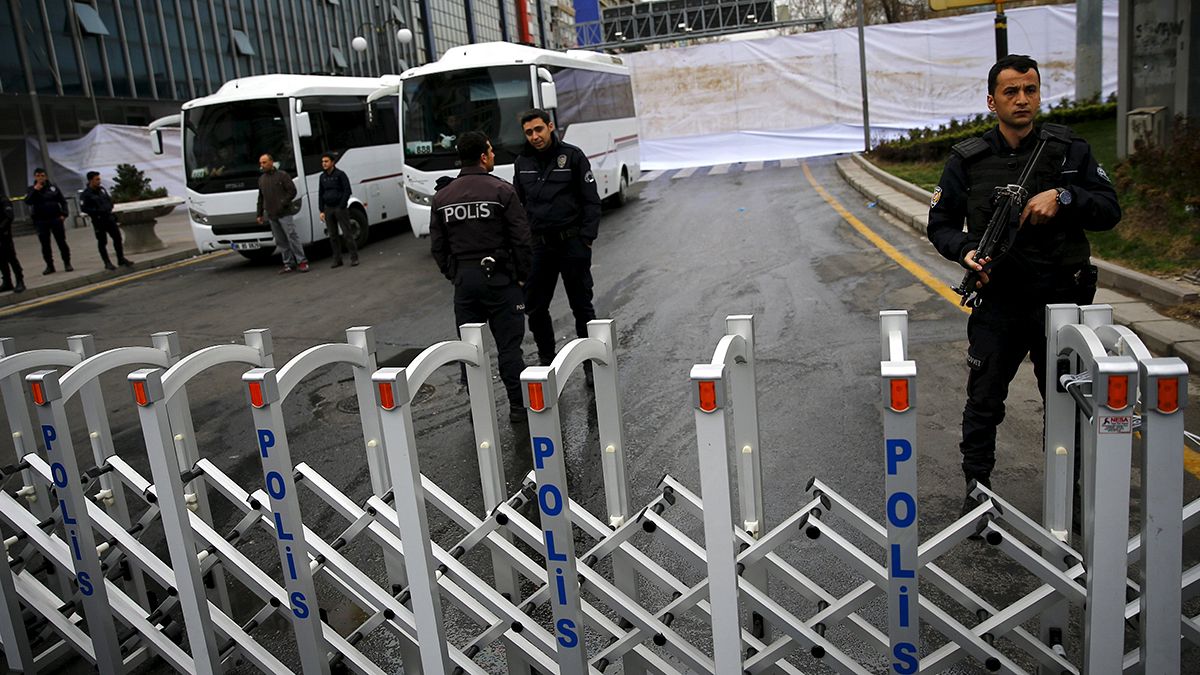Turkey has been quick to target Kurdish rebels in the southeast of the country and in Iraq, in the wake of Sunday’s deadly car bomb in Ankara that
Turkey has been quick to target Kurdish rebels in the southeast of the country and in Iraq, in the wake of Sunday’s deadly car bomb in Ankara that killed 37 people.
The government is clearly pointing the finger at the outlawed Kurdistan Workers Party (PKK). Prime Minister Ahmet Davutoglu said there were “very serious and almost certain” findings that the militant group was responsible. He added that eleven people had been detained, and that “all of their network” had been exposed.
PM
Ahmet_Davutoglu</a>: 11 suspects arrested in <a href="https://twitter.com/hashtag/Ankara?src=hash">#Ankara</a> attack case <a href="https://t.co/TVUvatiWMn">https://t.co/TVUvatiWMn</a></p>— Turkish Press Office (trpressoffice) 14 March 2016
Deputy Prime Minister Numan Kurtulmus said a woman was “definitely” one of the suicide bombers who struck in the Turkish capital. He told a news conference that a second bomber was male, although his identity had yet to be confirmed.
Turkish security officials were earlier quoted anonymously as saying they believed the two suspected bombers were a female member of the PKK, and a Turkish man with links to the outlawed movement.
Sources said the woman’s severed hand had been found 300 metres from the blast site – and that evidence suggested she was born in 1992 and came from the eastern city of Kars near the Armenian border, and had joined the PKK in 2013.
Anti-PKK operations
The Turkish military said 11 warplanes carried out airstrikes against 18 PKK targets in northern Iraq early on Monday, including ammunition depots and shelters. The militant group has bases in the mountains from where it controls operations across the border in Turkey.
In southeastern Turkey police detained four people in the city of Sanliurfa, north of the Syrian border, after reportedly establishing that the vehicle used in the bombing was bought from a car showroom there.
Earlier a round-the-clock curfew was declared in three southeastern towns. Many local people fled in anticipation of operations against Kurdish militants.
Altogether 15 people were detained in Istanbul in anti-PKK operations, and 50 more were held elsewhere in the country, CNN Turk reported.
President Recep Tayyip Erdogan said on Monday the definition of terrorists had to be broadened to include their supporters.
“It’s not only the person who pulls the trigger, but those who made that possible who should also be defined as terrorists, regardless of their title,” he said, adding that this could include journalists and politicians.
“These attacks do not diminish our will to fight against terror, but further boost it” https://t.co/HXwxEOlZ1Q
— Turkish Presidency (@trpresidency) 14 March 2016
Bomb scene examined
Sunday’s attack in Ankara, was the second on Turkey’s administrative heart in under a month. The bomb tore through a crowded transport hub a few hundred metres from the Justice and Interior ministries.
Officials say as with an attack in February on a military bus, explosives were again packed with pellets and nails to cause maximum injury and damage.
Among the victims was the father of footballer Umut Bulut, a Turkish international who plays for the Istanbul club Galatasaray.
An offshoot of the PKK, the Kurdistan Freedom Hawks (TAK), said it carried out last month’s attack. No group has claimed responsibility for Sunday’s bomb.
If, as Turkey alleges, it was Kurdish militants, such a direct attack on civilians would represent a major tactical change.
Militants have so far largely focused their strikes on security forces in southeastern towns, amid spiralling violence in the mainly Kurdish area since a ceasefire with the PKK collapsed last July.
Turkey has also faced an increasing threat from the self-proclaimed Islamic State, based in neighbouring Syria, which has also been blamed for attacks on Turkish soil.
You were Charlie, you were Paris, will you be #Ankara? https://t.co/vfGduTQd7Kpic.twitter.com/JTHUbpj2Za
— Sara Firth (@Sara__Firth) 14 March 2016
